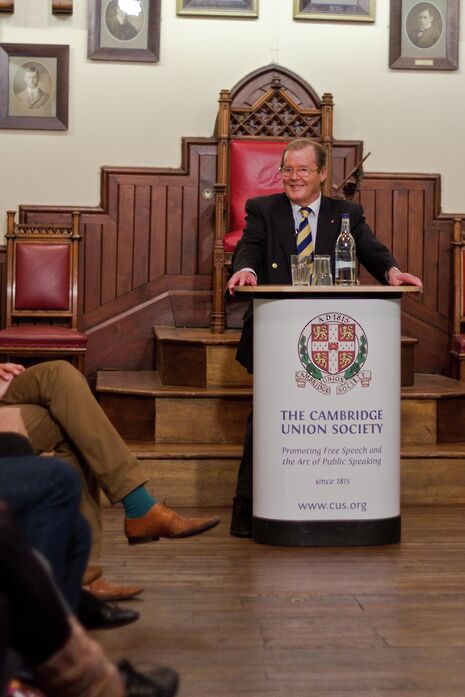“Connery is a good actor; it’s a pity I can’t understand what he’s saying.”
India Ross talks to Roger Moore about life, loves and his role in that spy film…
In the world of student journalism, some gigs are bigger than others. Sitting awkwardly in an oak-panelled chamber at the Cambridge Union, opposite the longest-serving actor in history to play James Bond, I recognise one of life’s “for God’s sake, be cool” moments.

Twenty-five years on, 007 has still got it. The face is a little wizened – perhaps a few martinis too many – and the old one-liners are punctuated with the odd senior moment, but none of the debonair charm of his alter ego has left him. Indeed the residual panache of Bond coupled with a Spike Milligan-esque old man humour (the two had become friends whilst serving in the Army) is rather winning. Moore jokes, “A hypochondriac is someone who thinks they’re sick; I know I’m sick.”
On the world of cinema, he is disarmingly candid. As a decidedly tongue-in-cheek Bond, he was described by one critic as “the lethal comedian”; I ask Moore how he rates Daniel Craig’s more hard-edged approach. Despite praising Craig’s portrayal of Bond, Moore was less convinced by the latest instalment, Quantum of Solace, which he cuttingly describes as “a long disjointed commercial”.
He is forthcoming with appraisal of any actors I suggest, and decides, after an extended period of contemplation – during which I wonder if I should rephrase the question – upon Johnny Depp as his favourite contemporary performer. Although, he says, “I wish he would change his name to something I can remember.”
Despite evident pride in his seven-film tenure as Bond, Moore often leans towards self-deprecation. Perhaps the part felt a little lightweight in comparison to the Shakespearean heroics of many of his contemporaries; indeed he was destined for a career in the theatre, having performed at the Cambridge Arts Theatre in the 1940s, and attended RADA, before being ‘seduced by MGM’ and pursuing a life on screen.
I ask if any dream roles had passed him by: “I’d have loved to have played Lawrence of Arabia, and I’d have loved to have been as talented as Peter O’Toole.” On his predecessor, Sean Connery, whose portrayal of Bond is a constant source of comparison, Moore remarks, “Sean is a good actor; it’s a pity I can’t understand what he’s saying.”
In contrast to the suave lothario of the 70s, today I get a sense of Moore the family man; a casual semi-retiree. His wife and step-daughter have accompanied him to Cambridge, and sit in on interviews, presumably for moral support and to supply the occasional name reminder. When I ask him about his favourite Bond girls, I gather that his sheepish response has been carefully crafted on numerous occasions: “my wife is my favourite Bond girl”.
We are interrupted by the Union team armed with a tray of martinis (the real life Bond takes them neither shaken nor stirred, but with a dash of Tanqueray) much to the delight of Moore, who clearly isn’t averse to this kind of tribute.
Roger Moore was awarded a knighthood in 2003 for his extensive work as a UNICEF ambassador, something he is keen to discuss, perhaps in part to deflect the inevitable Bond nostalgia which must have been the mainstay of decades of interviews. Questions about his most famous part are met with a concealed hint of weariness, and one gets the feeling that the legacy may be as much a burden to him as it is a source of pride.

Treading the steps of many a past icon, he is destined to perpetually relive his glory days, telling the same old anecdotes and fondly remembering stars who have been long lost in the generation gap. What I am delighted to hear for the first time must be, I remind myself, the stuff of tired rote for Moore, a sort of theatre production that has overstayed its run. Upon entering the Union chamber that evening as Guest Speaker to tumultuous applause, he introduces himself: “My name is Moore, Roger Moore.”
Roger Moore spoke at the Cambridge Union on October 25th
 News / Clare Hall spent over £500k opposing busway 24 December 2025
News / Clare Hall spent over £500k opposing busway 24 December 2025 News / Caius mourns its tree-mendous loss23 December 2025
News / Caius mourns its tree-mendous loss23 December 2025 Comment / The ‘class’ of Cambridge24 December 2025
Comment / The ‘class’ of Cambridge24 December 2025 Comment / Yes, I’m brown – but I have more important things to say22 December 2025
Comment / Yes, I’m brown – but I have more important things to say22 December 2025 Interviews / Politics, your own way: Tilly Middlehurst on speaking out21 December 2025
Interviews / Politics, your own way: Tilly Middlehurst on speaking out21 December 2025









